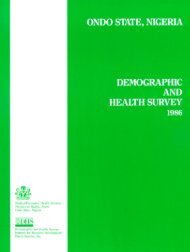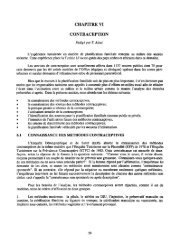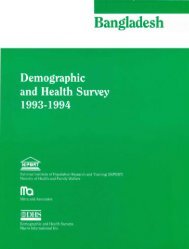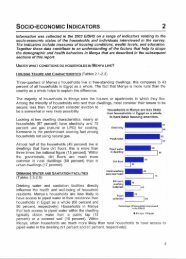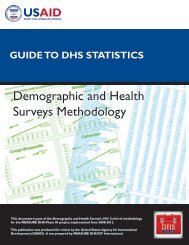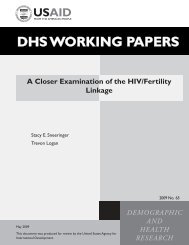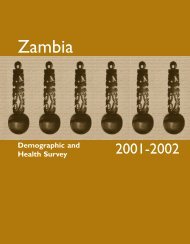Tanzania HIV/AIDS and Malaria Indicator Survey ... - Measure DHS
Tanzania HIV/AIDS and Malaria Indicator Survey ... - Measure DHS
Tanzania HIV/AIDS and Malaria Indicator Survey ... - Measure DHS
- No tags were found...
Create successful ePaper yourself
Turn your PDF publications into a flip-book with our unique Google optimized e-Paper software.
<strong>HIV</strong>/<strong>AIDS</strong>-RELATED KNOWLEDGE 55.1 INTRODUCTIONThe predominant mode of <strong>HIV</strong> transmission in <strong>Tanzania</strong> is through heterosexual contact,which accounts for over 90 percent of new <strong>AIDS</strong> cases, followed in magnitude by mother-to-childtransmission, whereby the mother passes the <strong>HIV</strong> virus to the child during pregnancy, at the time ofbirth, or through breastfeeding. Other modes of transmission can be through infected blood, bloodproducts, donated organs or bone grafts <strong>and</strong> tissues.Based on this evidence therefore, the future direction of this p<strong>and</strong>emic depends in large parton the existing level of knowledge of how the virus is spread amongst different population groups, theconsequent changes in sexual behaviour, <strong>and</strong> efforts to prevent mother-to-child transmission. Theinformation obtained from the 2007-08 <strong>Tanzania</strong> <strong>HIV</strong>/<strong>AIDS</strong> <strong>and</strong> <strong>Malaria</strong> <strong>Survey</strong> (THMIS) providesan opportunity to assess, amongst other things, the level of knowledge regarding transmission of the<strong>AIDS</strong> virus. The results are useful for <strong>AIDS</strong> control programmes to plan for their IEC interventionstargeting individuals <strong>and</strong> groups most in need of information <strong>and</strong> to strengthen interventions, aimed atpreventing mother-to-child transmission (PMTCT).The 2007-08 THMIS included a series of questions about <strong>HIV</strong>/<strong>AIDS</strong> knowledge <strong>and</strong>exposure to <strong>HIV</strong>/<strong>AIDS</strong>-related messages <strong>and</strong> information. For example, respondents were asked ifthey had ever heard of <strong>AIDS</strong>; if they knew about specific means of transmission of the virus; <strong>and</strong> ifthey were aware of mother-to-child transmission.5.2 AWARENESS OF <strong>AIDS</strong><strong>Survey</strong> results indicate that over 98 percent of <strong>Tanzania</strong>ns age 15-49 years have heard of<strong>AIDS</strong> (Table 5.1). The proportion is similar with results from the 2003-04 THIS <strong>and</strong> the 2004-05T<strong>DHS</strong>. Overall, awareness of <strong>AIDS</strong> is very high in both Mainl<strong>and</strong> <strong>Tanzania</strong> <strong>and</strong> Zanzibar, amongstmen <strong>and</strong> women in all age groups, <strong>and</strong> across background characteristics, with at least 90 percent ofpeople having heard of <strong>AIDS</strong>.To ascertain the depth of knowledge about modes of <strong>HIV</strong>/<strong>AIDS</strong> transmission, specificquestions were asked to respondents about whether it is possible to reduce the chances of getting<strong>AIDS</strong> by having just one faithful sexual partner, using a condom at every sexual encounter, <strong>and</strong> nothaving sex at all. These are the leading ways of preventing the spread of <strong>HIV</strong>/<strong>AIDS</strong>. Table 5.2 showsthe percentage of women <strong>and</strong> men by their answers on ways of preventing <strong>HIV</strong> infection.Over 80 percent of women <strong>and</strong> men say that abstaining from sexual intercourse <strong>and</strong> limitingsexual intercourse to one uninfected partner can reduce the chances of being infected with the <strong>AIDS</strong>virus. This belief is almost uniformly maintained amongst urban <strong>and</strong> rural populations, acrossdifferent age groups, marital status, <strong>and</strong> wealth quintiles <strong>and</strong> in almost all regions in <strong>Tanzania</strong>.Exceptions are women in Mbeya, Rukwa, <strong>and</strong> Shinyanga regions, where less than 70 percent knowthat limiting sex to one partner can reduce the chances of getting the <strong>AIDS</strong> virus.<strong>HIV</strong>/<strong>AIDS</strong>-Related Knowledge | 51



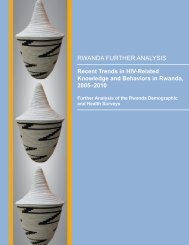

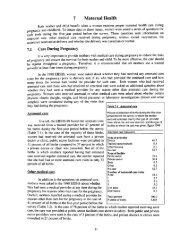


![Obtaining Informed Consent for HIV Testing [QRS4] - Measure DHS](https://img.yumpu.com/49850117/1/190x245/obtaining-informed-consent-for-hiv-testing-qrs4-measure-dhs.jpg?quality=85)
